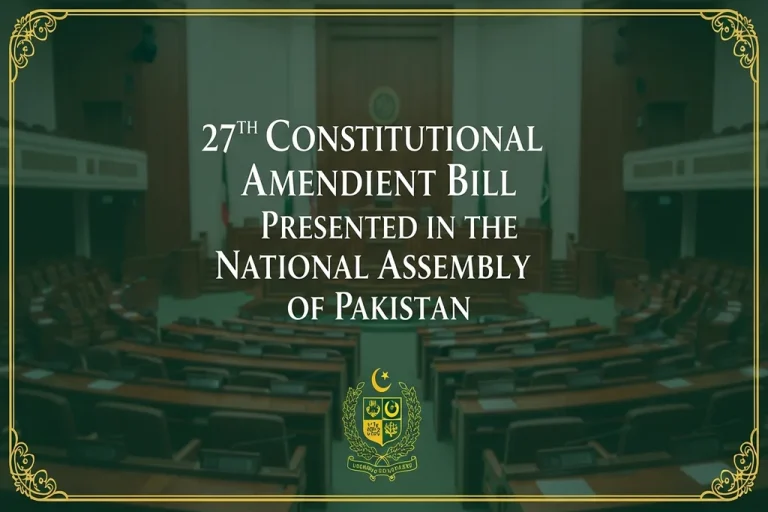On Tuesday, Azam Nazeer Tarar, the Law Minister, introduced the draft of the 27th Constitutional Amendment Bill in the National Assembly of Pakistan (NA). This came a day after the government successfully moved it through the Senate of Pakistan.
The amendment must be approved by a two-thirds majority in the NA. The ruling coalition holds a comfortable majority in the 336-member lower house, while the opposition has 103 seats. Within the coalition, the seats include: Pakistan Muslim League‑Nawaz (PML-N) with 125, Pakistan Peoples Party (PPP) with 74, Muttahida Qaumi Movement‑Pakistan (MQM-P) with 22, Pakistan Muslim League‑Quaid with five, Istehkam‑i‑Pakistan Party with four, and smaller parties such as Pakistan Muslim League‑Zia (PML-Z), Balochistan Awami Party and National Peoples Party with one seat each.
Today’s NA session opened with a prayer for PML-N’s veteran leader Irfan Siddiqui, who passed away yesterday. Afterwards, NA Speaker Ayaz Sadiq called on the minister to introduce the bill for consideration, as listed in the day’s agenda.
Minister Tarar recalled how when the 26th Amendment was introduced, two major parties had negotiated some changes under the Charter of Democracy, one of which was to create a “constitutional bench” instead of a “constitutional court”. He said that though things were settled at that time, concerns were raised that the system created a “court within a court” that might not work properly.
To address these concerns, Tarar said, coalition partners agreed that a new body — the Federal Constitutional Court (FCC) — should be established. He emphasized that this change does not abolish Article 184(3) of the Constitution (which deals with the original jurisdiction of the Supreme Court of Pakistan). Instead, the power under that article will transfer to the FCC, and a similar provision will be inserted after Article 175-B to define the FCC’s jurisdiction.
Tarar also clarified that the FCC will not have automatic “suo motu” powers (i.e., acting on its own without a case) for everything. Only when an application is submitted and the matter involves public importance or fundamental rights (as specified under Article 184(3)) will the FCC exercise that power. He insisted that the power is “not for grilling an individual”.
Regarding the transfer of judges, the bill proposes changes: the Judicial Commission of Pakistan (JCP) will be given the authority to handle judge transfers. If a judge refuses a transfer, he can present his case to the JCP. If the transfer decision stands and the judge still refuses, the matter goes to the Supreme Judicial Council (SJC) for a final decision.
Under the proposed amendment, there will be two apex courts: the Supreme Court and the FCC. The FCC will broadly carry the powers previously held by the constitutional bench under the 26th Amendment — including jurisdiction under Articles 184 & 186 (interprovince issues, presidential references, case transfers, and writ petitions under Article 199, with some exceptions). The minister argued that this division will lighten the load on the Supreme Court, allowing it to focus on ordinary citizens’ justice.
The current Chief Justice of Pakistan (CJP) Yahya Afridi will continue to head both the JCP and SJC based on seniority. Among top judges of the Supreme Court and FCC, the senior judge will lead the body; if multiple judges are appointed on the same day, seniority will be determined by their high-court or Supreme Court entry date.
A five-judge panel for the JCP is proposed, comprising the most senior puisne judges of both high courts, with the two chief justices selecting the fifth member. If they cannot agree, the panel decision will go to the Commission.
Earlier in the Senate, the amendment had passed with 64 votes (in a 96-member house) after two opposition senators defected. While the bill was being voted clause-by-clause, opposition Senators staged protests—chants, paper tearing and walk-outs. The Senate Chairman announced the bill’s passage once the division vote was held.
Changes incorporated into the bill include: ensuring equal provincial representation and a representative from Islamabad High Court in the FCC; reducing the minimum high-court-service requirement for FCC judges from seven to five years; maintaining seniority among sitting Supreme Court judges; revising the nomination criteria for the JCP to favour technocrats rather than just women or non-Muslims; clarifying that suo motu powers are retained but only via application; introducing that interim stay-orders in revenue-related matters will lapse automatically after one year if no decision is delivered; and amending life-time immunity under Article 248 for the President, Field Marshal, Marshal of the Air Force and Admiral of the Navy relating to public office.
More Breakings Visit Our Website







